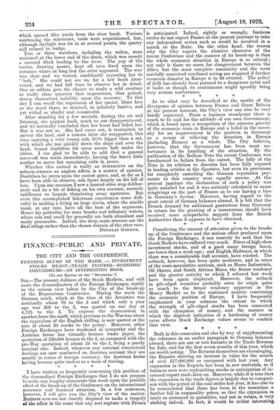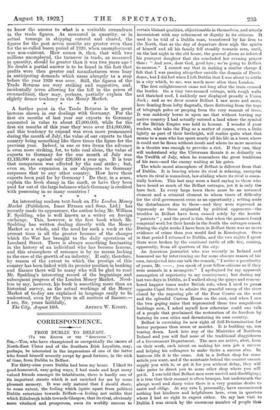FINANCE—PUBLIC AND PRIVATE.
Tab CITY AND THE CONFERENCE.
FURTHER SLUMP IN THE MARK. — INVESTMENT STOCKS REACT TRADEFIGURES—ECONOMIC CONUNDRUMS—AN INTERESTING BOOK.
[To THE EDITOR OF THE " SPECTATOR."?
SIR,—The present dullness of the Stock Markets, and still more the demoralization of the Foreign Exchanges, testify to the serious view taken by the City of the break-up of the Reparations Conference. During the week the German mark, which at the time of the Armistice was nominally about 70 to the £ and which only a year ago was 308 to the £, was quoted on one day at 4,725 to the I. To express the depreciation in another form the mark, which previous to the Warwas about the equivalent of the English shilling, is now quoted at the rate of about 20 marks to the penny. Moreover, other Foreign Exchanges have weakened in sympathy and the Austrian krone has virtually become waste paper, the quotation of 250,000 kronen to the £, as compared with the pre-War quotation of about 24 to the £, being a purely nominal one. Indeed, wherever any external commercial dealings are now conducted on Austrian account they are usually in terms of foreign currency, the Austrian krone having become quite useless as a basis of trading. * * * * I have written so frequently concerning this problem of the demoralized Foreign Exchanges that I do not propose to make any lengthy comments this week upon the possible effect of the break-up of the Conference on the international economic and financial situation. In a few sentences, however, I will give you the City's view of the matter. Business men are not exactly disposed to make a tragedy of the affair in the sense that any real rupture with France is anticipated. Indeed, rightly or wrongly, business circles do not expect France at the present juncture to take any independent action such as would be involved in a march to the Ruhr. On the other hand, the reason why the City regrets the abortive character of the recent Conference and the manner of its break-up is that the whole economic situation in Europe is so critical ; not only is there no room for disagreement between the Allies, but the most complete unanimity and the most carefully conceived combined acticp. are required if further economic disaster in Europe is to be averted. The policy of drift has already been pursued to a dangerous point and it looks as though its continuance might speedily bring very serious misfortunes.
* *
As to what may be described as the merits of the divergence of opinion between France and Great Britain at the present moment, the City's view can also be very briefly expressed. From a business standpoint there is much to be said for the attitude of our own Government, which is based upon a recognition of the extreme gravity of the economic crisis in Europe and a belief in the neces- sity for an improvement in the position in Germany as a means of relieving the situation in Europe (including France) as a whole. The City believes, however, that the Government has been most un- fortunate in its handling of the situation. By the publication of the Balfour Note the recent Conference was foredoomed to failure from the outset. The folly of the Note in its relation to America has been fully exposed in leading articles in the Spectator, but even its provisions for completely cancelling the German reparation pay- ments to this country were equally unwise. At the present juncture the declaration of such a policy was quite uncalled for and it was certainly calculated to cause misgivings on the part of France as to our having a bias in Germany's favour. Moreover, having regard to the great extent of German balances abroad, it is felt that the French demand for additional guarantees from Germany in return for the granting of a moratorium should have received more sympathetic support from the British Authorities than it appears to have obtained.
Considering the amount of attention given to the break. up of the Conference and the serious effect produced upon the Foreign Exchanges, it can scarcely be said that the Stock Markets have suffered very much. Prices of high-class investment stocks, and of a good many foreign loans, are lower than a week ago ; and English Railways, in which there was a considerable bull account, have reacted. The setback, however, has been quite moderate, and in some of the more speculative sections, such as Home Industrials, Oil Shares, and South African Mines, the firmer tendency and the greater activity to which I referred last week have been again displayed. Moreover, the setback in gilt-edged securities probably owes its origin quite as much to the firmer tendency apparent in the Money Market as to the continued anxiety concerning the economic position of Europe. I have frequently emphasized in your columns the extent to which the strength of gilt-edged stocks has been connected with the cheapness of money, and the manner in which the slightest indication of a hardening of money rates affects Stock Exchange values seems to confirm that view.
Both in this connexion and also by way of supplementing the reference in an earlier paragraph to German balances abroad, there are one or two features in the Trade Returns for July, and for the first seven months of this year, which are worth noting. The Returns themselves are encouraging, the Exports showing an increase in value for the month of over £17,000,000 as compared with last year. Any expansion in the Imports has been in raw materials, as if business men were replenishing stocks in anticipation of in- creased export trade later on. Moreover, while it is true that the expansion in the trade figures is largely due to compari- son with the period of the coal strike last year, it has also to be remembered that there has been in the meantime a further fall in commodity prices, so that the expansion in trade as measured in quantities, and not in values, is very striking indeed. In fact, it would be rather interesting, to know the answer to what is a veritable conundrum in the trade figures. As measured in quantity, or in actual tonnage in shipping entered and cleared, the figures for the past seven months are greater even than for the so-called boom period of 1920, when unemployment was non-existent. How comes it, then, that with two millions unemployed, the turnover in trade, as measured in quantity, should be greater than it was two years ago ? No doubt a partial answer is to be found in the fact that profits were then greater and manufacturers were busy in anticipating demands which came abruptly to a stop before the year 1920 was over. Still, the figures of the Trade Returns are very striking and suggestive, and, incidentally (even allowing for the fall in the prices of commodities), they may, perhaps, partially explain the slightly firmer tendency in the Money Market.
A further point in the Trade Returns is the great increase shown in our dealings with Germany. For the first six months of last year our exports to Germany amounted in value to about £7,000,000, while for the first six months of this year they were over £14,000,000, and this tendency to expand was even more pronounced during the month of July, the value of our exports to that country being something like three times the figure for the previous year. Indeed, in one or two items the advance is even more striking, for, to take coal alone, the value of exports to Germany for the one month of July was £1,135,000 as against only £26,000 a year ago. It is true that comparison was affected by the coal strike ; but, even so, the expansion in our shipments to Germany surpasses that to any other country. How have these exports been paid for by Germany ? Do they, in a sense, explain the fresh slump in the mark, or have they been paid. for out of the large balances which Germany is credited with possessing in so many countries ?
* * * *
An interesting modern text-book on The London Money Market (Publishers, Isaac Pitman and Sons, Ltd.) has recently made its appearance, the author being Mr. William F. Spalding, who is well known as a writer on foreign exchange. This, however, is the first book which Mr. Spalding has written dealing directly with the Money Market as a whole, and the need for such a work at the present time is all the greater because of the changes which the War has brought to the daily operations of Lombard Street. There is always something fascinating in the history of an individual who has become famous, and this atmosphere of romance is by no means lacking in the case of the growth of an industry. If only, therefore, by reason of the extent to which the prestige of this country has been linked with its premier position in banking and finance there will be many who will be glad to read Mr. Spalding's interesting record of the beginnings and subsequent progress of the London Money Market. Need- less to say, however, his book is something more than an historical survey, as the actual workings of the Money Market of to-day are explained in language easily to be understood, even by the tyro in all matters of finance.— I am, Sir, yours faithfully,



































 Previous page
Previous page